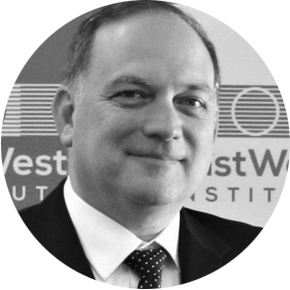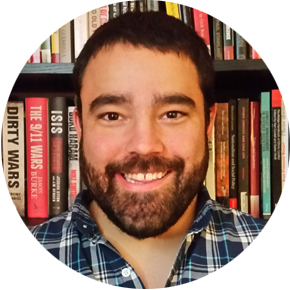Dr. William J. Parker is the CEO and President of the EastWest Institute. He is the former Chief Executive Officer of the National Defense University Foundation.
Dr. Parker, in your latest book, Guaranteeing America’s Security in the 21st Century, you define “Threat” in terms of an intent and capability to harm. What are the major threats to the global security today that fall under this definition?
In general, when we talk about threat, we talk about the intent to harm and the actual capability to do so. It is when both the intent and capability are high that the threat is the highest.
When speaking about threats to global security, we need to differentiate between state actors and non-state actors. North Korea is said to have significant weapons capability and potentially the will to use them – so they will continue to be a threat to the world until their nuclear program is dealt with. Several countries– like Russia and China have significant weapon capability, but they haven’t expressed an intent to use them. So, they are a lower threat now, but they could rise to a higher threat quickly, because intent, unlike capability, can change quickly.
As for the non-state actors, the prospect of ISIS and other terrorist groups obtaining weapons of mass destruction poses a major threat to global security. Even though ISIS has been in great part defeated on the battlefield and weakened significantly, it and other organizations still pose a threat, especially when coupled with a major weapons capacity.
Currently one of the greatest threats to world security is the refugee crisis. According to United Nation’s data there are approximately 70 million refugees in the world. This will continue to get worse until we are able to manage the economic, financial and security issues of these people and help them get back to where they originally came from. We need to make sure that the refugees are living a humane life in their host countries, and we must also take steps to prevent the prospect of future refugee crises, which poses a threat on many levels.
Are we proceeding towards a bipolar world? What do you think will be the US-Russia-China power configuration in the future?
On the surface, it appears the world is watching a potential return to a bipolar world once again, unfortunately. But now, instead of the Soviet bloc countries, experts see the U.S. on the one side and China on the other.
There are many factors at play. The U.S. economy is currently getting stronger, with significant investment going into the military. China is building a new sophisticated military, and is at the same time extending its influence through initiatives like the Belt Road Initiative and development of the 5G network.
If China helps to denuclearize North Korea, that will be a positive sign. But if they don’t, then there is a risk that Japan, Iran and then the rest of the Middle East may seek to go nuclear as a chain reaction. This is not an enviable scenario, and can result in losing control over the fissile material around the globe, which will be a major threat to world stability. China, has the most to lose – economically and regarding security – with an unstable Korean Peninsula.
Russia remains a major player but is undergoing a transition in regards to its economy and demographics. Russia could either become a near-peer competitor or an adversary to the U.S. and China. If Russia becomes a competitor, this will make the whole world better, because we can advance technology and commercial activities.
Competition between nations will of course continue. This simply places the onus on each nation’s leadership to maintain dialogue, seek areas of cooperation and ensure a healthy relationship, not an adversarial one.
EastWest Institute focuses on conflict prevention and resolution. What are the means you use to resolve or prevent conflict?
To prevent conflict, you first have to understand the core issues at hand and the perspectives of the parties involved. Then you go after these challenges by building trust between the key actors. The way you build trust is to deconstruct the issue, find common ground and what may be a resolution that provides a win-win situation. That’s how we bring stability between opposing sides.
The key remains maintaining open dialogue, listening to the concerns of all parties involved, fostering trust and then seeking solutions together. It sounds straightforward but requires an established methodology and means by which to bring the right people to the table.
You recently visited Armenia to participate in the Summit of Minds, which discussed political and business issues, as well as investment opportunities. What are your observations in terms of the growth and investment opportunities in Armenia?
I think there is a real possibility of seeing significant growth in Armenia in the near future, under the new leadership. Of course, it would be beneficial for the Armenian economy if one of the closed borders were opened.
If I were to make a recommendation regarding where to invest in Armenia, I would focus on the human capital. Of course, there are significant sectors such as the wine industry, textiles, IT, Artificial Intelligence and machine learning that are a core focus, but these are all dependent on the number one asset – a talented workforce. Armenians are well educated, intelligent and have moral and ethical standards. As such, investments are sector specific but with the confidence of the intelligence and ability of Armenians.
If you look at some of the entities in the educational sector such as the UWC Dilijan College for instance, you can see pretty spectacular work there. It is impressive that they bring students from over 70 countries to study in a multicultural environment, in Armenia. I believe education is where the investors will get a return on their investment quickly.
It is also important that President Armen Sarkissian is well received and quite popular in the U.S. He comes across as a very intelligent, articulate and well-informed person. He has that Bobby Kennedy type of persona, as a person who is prepared to stand up and speak to the crowds when things get tough. His personality is yet another factor that inspires confidence in the investment potential of Armenia.
Nvard Chalikyan talked to William Parker



























Comments
Dear visitors, You can place your opinion on the material using your Facebook account. Please, be polite and follow our simple rules: you are not allowed to make off - topic comments, place advertisements, use abusive and filthy language. The editorial staff reserves the right to moderate and delete comments in case of breach of the rules.